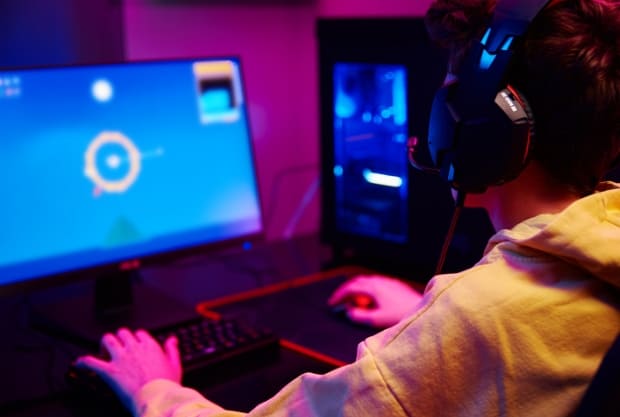Gaming PCs consume a lot of power!? Here’s how to Reduce.
It was common to use a dedicated game console to play games, and many people enjoy playing games on them.
However, since the rise of the Internet over a decade ago, the popularity of gaming on computers has increased. A “gaming PC” is a computer developed to comfortably play games on a computer. Depending on the type of game you play, a gaming PC may be required.
So this time, we will introduce what kind of computer is a gaming PC, and what you can do to reduce the power consumption of a gaming PC with high capacity specifications.
How a gaming PC is it different from a regular computer?
There are many different types of personal computers on the market today. Each type has different specifications, and it is common to choose one according to the purpose.
For example, if your main purpose is to carry your computer with you daily for surfing the Internet, you will probably choose a computer that emphasizes compactness and battery life over processing power and data capacity. Also, if you often do heavy data processing, you will want to choose a high-spec computer.
Gaming PCs, among the many types of computers, are computers whose main purpose is to play games. Games that heavily utilize 3D graphics etc. require extremely high processing power. For this reason, gaming PCs are being sold as models equipped with stronger power connector for graphics boards and a robust CPU chip, as well as large-capacity memory to increase the efficiency of simultaneous processing.
The specifications needed will differ based on the game you play but to truly fulfill your gaming experience on a computer, owning a gaming PC is crucial. Over the past few years, numerous gaming PC models sold by different brands.
Do gaming PCs consume a lot of power?

As mentioned above, a gaming PC is a must for playing games comfortably, but there are some things to keep in mind. Power consumption is one of them.
In recent years, CPUs with low power consumption have been developed, and laptops that can be used for longer periods than ever before have appeared. Therefore, many people may not be very conscious about the power consumption of their computers.
Nevertheless, it’s important to note that gaming PCs are equipped with extremely high processing power, so power savings will be significant.
What is the difference in power consumption between a regular computer and a gaming PC?
So, specifically, what is the difference in power consumption between a regular computer and a gaming PC?
A typical desktop computer consumes around 100W to 120W per hour, while power-efficient laptops use even less energy. On the other hand, when running cutting-edge 3D games that demand high processing power on a high-spec gaming PC, the power consumption exceeds 300W per hour. This amount is more than three times higher than that of a standard computer.
This means that if you use a gaming PC, your electricity bill could be three times higher than a regular PC. Of course, the longer you use your computer, the greater the difference in your electricity expenses will be.
How to reduce the power consumption of gaming PCs?

Reducing the power consumption of your gaming PC doesn’t mean you have to compromise on performance or your gaming experience. It is possible to reduce power consumption by changing the way you use your computer and making improvements. Here are a few friendly ways:
1. Select the power supply for “80PLUS”
One of the factors that has a major impact on a computer’s power consumption is the power supply unit. Although you may not usually be aware of it, there are differences in power conversion efficiency depending on the power supply unit.
The higher the conversion efficiency, the more power can be supplied to internal parts without loss, leading to reduced power consumption levels.
We especially recommend power supply units bearing the “80PLUS”, known for their efficiency of 80% or higher in power conversion. If you’re worried about your gaming PC’s electricity costs, start by first inspecting the power supply unit.
By replacing your power supply with an “80PLUS” power supply, you can lower power usage, avoid computer overheating, as well as enhance performance all at once.
2. Frequent shutdown
It’s basic, but frequently shutting down your gaming PC is a simple yet effective way of saving power. The hassle of starting up your gaming PC every time you use it, and many people end up leaving it on even when they’re not using it.
Since it draws power while on, it’s advisable to shut it down when not in use for a certain period.
You can save on standby power by unplugging your computer when shutting down, but be careful not to plug and unplug it frequently, as this will accelerate the deterioration of the power outlet.
3. Prevent your computer from overheating
When a computer produces heat, the cooling fan accelerates to reduce the temperature, resulting in increased electricity consumption. To prevent overheating, it’s crucial to maintain a cool environment for your computer in which your computer does not get hot. Avoid placing it in direct sunlight, ensure the heat vents are unobstructed, and promote good airflow around the device.
Moreover, excessive heat not only raises power usage but also leads to performance degradation and failure. Therefore, it’s vital to address heat generation beyond just the power consumption perspective.
4. Lower the speaker volume/use earphones
Sound quality is an important aspect of gaming pleasure. However, if you play loud music through speakers, that much power will be consumed.
To cut down on your electricity costs, we suggest lowering your speaker volume or opting for headphones. For games that don’t rely on sound, muting the volume entirely can also be a smart move.
[Related]
- x86 vs x64 CPU: What’s the Difference? (64-bit vs 32-bit)
- How Long do Motherboards Last?
